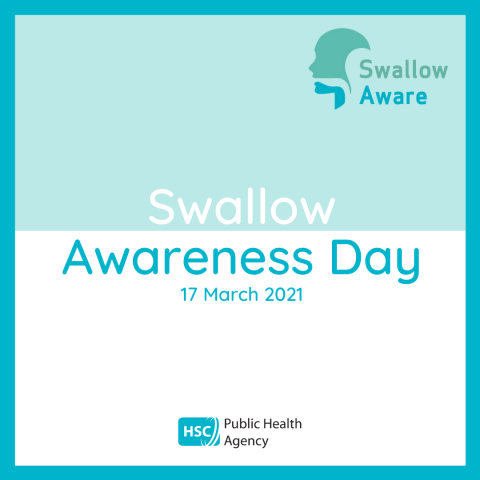Animation launched to raise awareness of swallowing difficulty

Eating, drinking and swallowing difficulties can affect anyone at any stage of their life, so the Public Health Agency (PHA) has released a new animation to raise awareness of this issue.
Dysphagia is the medical term for swallowing difficulties. Some people with dysphagia have problems swallowing certain foods or liquids, while others can't swallow at all.
Michelle Tennyson, Assistant Director for Allied Health Professions (AHP) at the PHA, said: “Eating, drinking and swallowing difficulties can occur at any stage of life, and can often occur alongside other conditions, such as prematurity, learning disability, dementia and stroke.
“So many social occasions revolve around food and drink, such as going out for a coffee with a friend or family mealtimes. People with eating, drinking and swallowing difficulties have to think about how they’ll be able to eat or drink at these events, and sometimes avoid them entirely.
“Without the right support in place, the impact on the life of someone who has eating, drinking or swallowing difficulties can be enormous. It can lead to embarrassment, social isolation and negatively impact the person’s mental health.”
Dysphagia can lead to weight loss, chest infections, pneumonia and even death so it is important you seek help.
The eating, drinking and swallowing awareness animation aims to raise awareness of the signs of eating, drinking and swallowing difficulties and encourage the individual and or their carers to seek support.
Signs of difficulty when eating, drinking and swallowing include:
- Coughing or choking during or after meals or drinks
- Change in voice quality e.g. “gurgly” or wet voice
- Change in breathing e.g. wheezy or shortness of breath
- Change of colour in the face
- Pain or great effort to swallow
- Food left behind in the mouth
- High risk behaviours, like not chewing enough, overfilling the mouth, eating or drinking too quickly.
- Recurrent or regular chest infections – not accompanied by signs of the cold.
Michelle Tennyson concluded: “If you notice any of these symptoms or care for someone who has them, it is important not to ignore it. Sometimes these difficulties can be a symptom of other illnesses, so it’s important to get it checked out.
“Help and support is available to help you live well with a swallowing difficulty. Contact a health care professional such as your GP or Speech and Language therapy service.
For further information see: pha.site/Dysphagia
The animation can be viewed here: https://vimeo.com/524198745
ENDS
